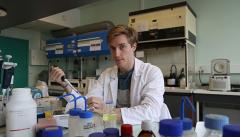
Axes de recherche et expertise
Justin Maire - Prix de thèse INSA 2018
Suite à sa candidature à la seconde édition ʺPrix de thèseʺ organisée par l’INSA Lyon en 2018, Justin Maire remporte le prix de la meilleure thèse dans l’enjeu sociétal Santé globale et bioingénierie pour ses travaux portant sur "Immune and developmental regulations in host-symbiont interactions in the cereal weevil Sitophilus spp.". Le jury composé de la directrice de la recherche, des VPs enjeux sociétaux, de la directrice de la formation et des études doctorales a souligné l’excellence de son parcours scientifique et la richesse de son dossier.
La cérémonie de remise des prix de thèse aura lieu le Jeudi 14 Novembre 2019 à partir de 14h sur le campus de l’INSA Lyon.
Tout le laboratoire BF2i adresse ses plus sincères félicitations à Justin pour ce prix amplement mérité !
--
Doctorant : Justin MAIRE
Laboratoire INSA : BF2I
Ecole doctorale : ED341 : Evolution Ecosystèmes Microbiologie Modélisation
Symbiosis is ubiquitous in nature and plays a crucial role in evolution. As the scientific community is becoming increasingly aware of the importance of such associations in both biological and pathological processes in animals, understanding how symbiotic populations are controlled, tolerated, and modulated, is becoming a major stake. To address these questions, I studied the mutualistic association between the weevil Sitophilus and the intracellular bacterium Sodalis pierantonius. Sitophilus houses S. pierantonius in specialized host cells, the bacteriocytes, which group together in an organ, the bacteriome. In return, S. pierantonius provides its host with nutrients scarecely present in its cereal-based diet. S. pierantonius being immunogenic for its host, I studied in a first chapter how specific bacteriome immune regulations ensure the maintenance of host immune homeostasis. In a first part, I showed that endosymbiont compartmentalization, which limits host-endosymbiont immune contacts, relies on the IMD-dependent expression of one antimicrobial peptide, a regulation similar to that of immune responses in pathogenic conditions. Then, I showed how endosymbiont immunogenicity, via its peptidoglycan, is tamed by PeptidoGlycan Recognition Proteins (PGRPs). While symbiotic peptidoglycan would not be recognized within the bacteriome, its systemic recognition is circumscribed by PGRP-LB local action. PGRP-LB cleaves symbiotic peptidoglycan, thereby preventing a chronical and detrimental activation of the host systemic immunity. In a second chapter, I studied how, during metamorphosis, the bacteriome is completely remodeled. The larval bacteriome dissociates, bacteriocytes migrate along the midgut, and settle in multiple new bacteriomes. A dual-RNAseq approach allowed us to pinpoint both host and symbiont implication in this drastic morphological reorganization. The results obtained during this PhD show the immeasurable impact bacteria bear on host immune and developmental processes, and more generally on animal evolution.

